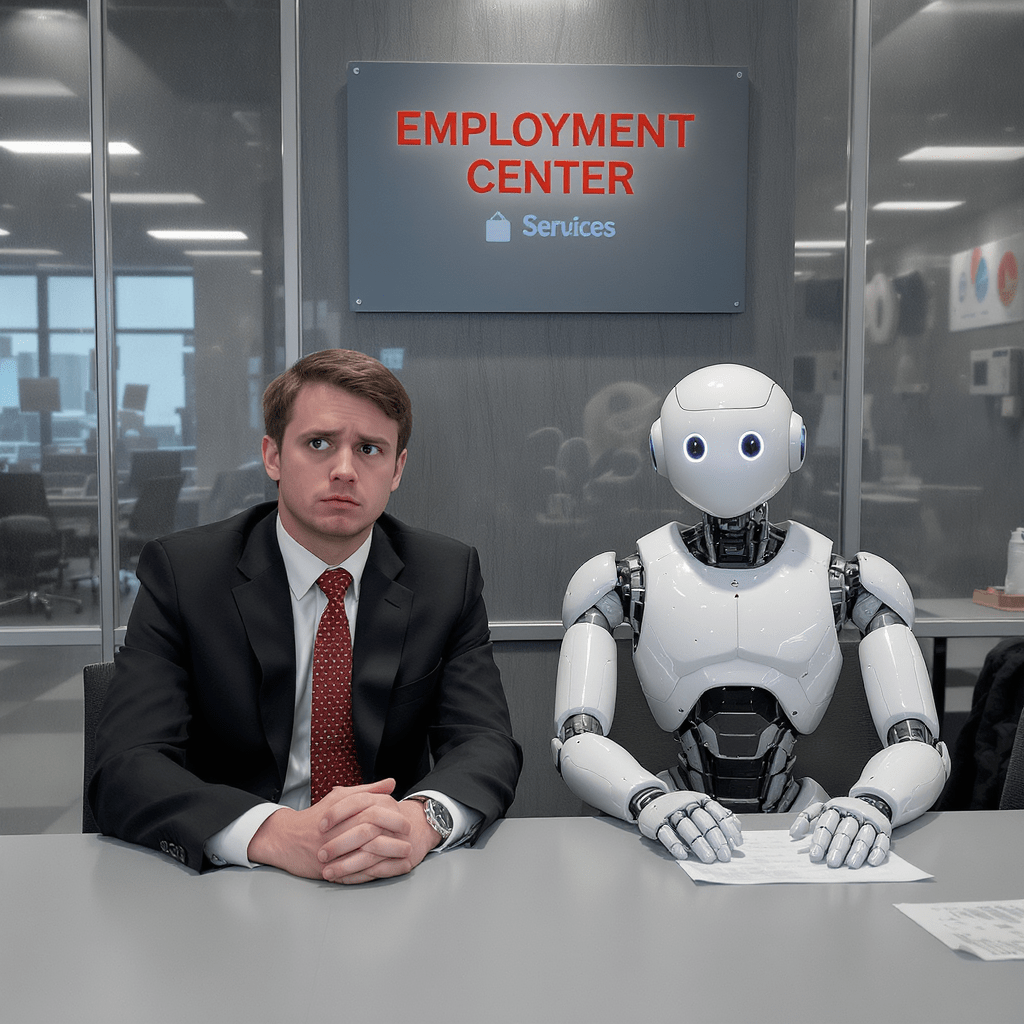Forging a New Economy of Worth
The Looming Jobsolence

Defining Jobsolence
Jobsolence is a term coined by Equilibria to define the structural obsolescence of human professions, skills, and livelihoods resulting from their replacement by advanced technological systems, primarily artificial intelligence, automation, and robotics.
It is fundamentally different from cyclical unemployment of past eras.
The key distinctions are Speed and Scope:
- Speed: The pace of AI development is exponential. Professions that felt secure mere years ago are now facing existential challenges, leaving societies and individuals with insufficient time to adapt.
-
Scope: Previous revolutions primarily impacted manual labor. The AI revolution directly targets cognitive, creative, and administrative domains, threatening a vastly broader spectrum of human work.
Jobsolescence is the process of human capabilities, efforts and contributions lose their economic value, not because of market downturns, but because a non-human system can perform them more efficiently. It represents the specific, modern threat of being rendered economically stranded during this technological transition, a silent crisis unfolding in the absence of adequate social safety nets to counter its effects.
A Sobering Consensus
The Universal Challenge
The initial conversation around AI displacement was non-threatening because it was contained, focusing on a narrow band of roles.
That era of containment is over!
Today, the visionaries, technologists, and researchers at the forefront of artificial intelligence are no longer speaking in hypotheticals. A sobering consensus has emerged, forecasting a societal shift of unprecedented scale and speed.
-

Leading futurist Martin Ford warns that automation could outpace the creation of new jobs, risking social instability.
-

Anthropic CEO Dario Amodei warns of a near-term “white-collar bloodbath,” wiping out vast numbers of entry-level knowledge worker jobs.
-

Godfather of AI Geoffrey Hinton speaks of the mass displacement of “mundane intellectual labor.”

The sober forecast from these leading minds is not a fringe theory; it is the central projection. 40% to 80% of all current jobs face fundamental transformation or outright elimination within the next one to two decades.
This is not a story of one sector. It is a universal challenge that cuts across the entire global economy:
-
Cognitive & Administrative Labor: Roles centered on research, data analysis, reporting, legal discovery, and even software programming are being augmented and replaced by AI that can process information at a superhuman scale.
-
Creative & Design Labor: Fields once considered uniquely human, writing, graphic design, musical composition, architectural modeling, now face powerful generative tools that can produce high-quality alternatives in seconds.
-
Physical & Logistical Labor: The revolution in robotics and autonomous systems continues to diminish the need for human involvement in manufacturing, transportation, and agriculture.
The critical question for our society is no longer if this disruption will happen, but what structure of meaning, purpose, and value will exist on the other side of it.

The familiar defaults
The Limitations of Legacy Solutions
Faced with this paradigm shift, society has defaulted to contemplating several legacy solutions. These are fundamentally unprepared for the scale and nature of Jobsolence.
-
Mass Retraining: The idea of simply retraining people for new jobs is a race against an accelerating target. It is impractical to retrain a global population for a constantly shrinking pool of non-automatable tasks, and it fails to address the core issue: the very definition of “economically valuable work” is changing.
-
Protectionist Legislation: Attempts to “ban” or restrict AI and automation to “save jobs” are akin to trying to hold back the tide. This approach forfeits the immense potential benefits of technology and ensures economic stagnation, ultimately failing to solve the underlying displacement.
These approaches are insufficient, but the most prominent proposed solution, Universal Basic Income, deserves its own deep analysis, as its seductive simplicity hides a profound implication.
The Siren Song of Universal Basic Income
Of all the proposed solutions, Universal Basic Income stands out as the quickest, most integrated, and seemingly non-disruptive path forward. It appears to be an elegant and efficient option: as jobs are automated away, a portion of the immense wealth generated is distributed as a basic stipend, ensuring everyone has the means to subsist.
This is the path of least resistance. It is also a path with a precarious blind spot. The current UBI narrative rarely discusses its inevitable endgame. It conveniently ignores the fundamental dynamics of power and obligation.
We must ask the hard questions:
-
Who pays for UBI? It will be funded by the automated economy, with wealth and the means of production concentrated in the hands of a select few entities, be they corporate or state.
-
What is the hidden obligation? In our current models, taxpayers resist funding social services. To believe that the funders of a global UBI will do so with no strings attached, in perpetuity, is to embrace a fantasy. An obligation-free handout at this scale does not exist.
-
What will that obligation look like? The true cost of UBI will not be monetary. It will be compliance. It will be an adherence to social credit systems, a forfeiture of data privacy, and a quiet acceptance of behavioral mandates, all in exchange for the stipend that ensures your survival.
In this scenario, UBI ceases to be a tool of freedom and becomes the ultimate mechanism for control. It creates a state of unchallenged dependency, a comfortable and technologically, advanced form of serfdom.
It is a blueprint for a world where humanity is kept, not empowered.
Equilibria: An Economy of Human Relevance
Equilibria was architected as the direct antidote to Jobsolence and the implications of UBI. It offers a fundamentally different path by creating a parallel humane welfare economy.
-
It Values Uniquely Human Skills: The ecosystem is built to recognize and reward contributions AI cannot replicate: mentorship, ethical oversight, community leadership, creative problem-solving, and empathetic guidance. It creates a new marketplace for human wisdom.
-
It Creates a New Ledger of Worth: While the old economy’s ledger may deem a skill “obsolete,” Equilibria’s ledger, the transparent record of contribution and impact, recognizes that same skill as a valuable Human Resource.
-
It Is Built on Stewardship, Not Dependency: Participation in Equilibria is active. Beneficiaries are stewards of their own initiatives, managing resources and delivering impact. The framework is built on transparent, empowering Obligation, which is fulfilled through successful work that builds reputation, skill, and dignity.
Jobsolence is the logical endpoint of an economy that values only efficiency. The dependency of UBI is the logical endpoint of a society that separates income from contribution.
Equilibria is the beginning of a new paradigm.

The Opportunity
Become a Pioneer
Equilibria is currently in its foundational phase, building the core platform through Equilibria-Led Initiatives (ELIs). We are seeking Pioneers—visionary individuals and partners with expertise in technology, social impact, governance, and community building—to help us shape this new paradigm. Your early involvement is crucial to building a system designed to be owned and operated by the people, for the people.
We’re building a decentralized humane welfare ecosystem, an alternate social safety net powered by collective action and shared purpose. This is where your unique spark can ignite real change and help forge a more resilient future for all.

